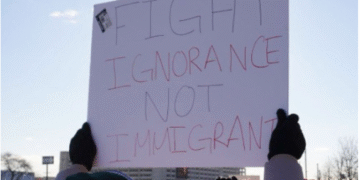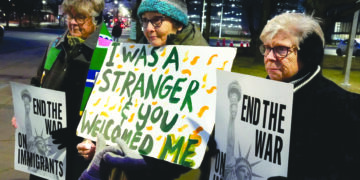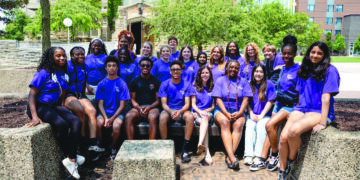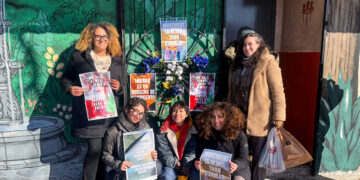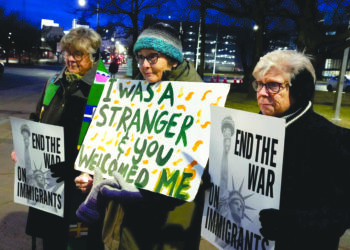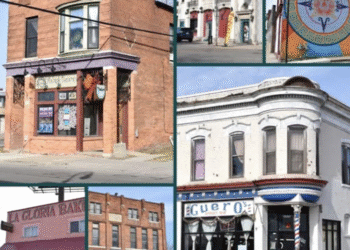On a Friday morning in Southwest Detroit, about 15 seniors gathered for a hot lunch at the Latin American for Social and Economic Development ( LASED) – Senior Center, a welcoming space where older adults gather for social activities, and wellness programs in the heart of the Mexican community. But in recent months, a surge in immigration deportations has unsettled that sense of safety, leaving many older Latinos living in fear.
“I’ve seen personality changes, behavior, and complaints of no sleep,” said Guadalupe Lara, Director of LASED Senior Wellness Programs. “But we encourage the ones that still come. It certainly affected everybody at the center,”
Lara noticed the behavioral changes after President Donald Trump signed a flurry of executive orders immediately following his inauguration in January. This included one on Enhanced Immigration Enforcement, fulfilling his campaign promise to send Immigration and Customs Enforcement (ICE) agents across the U.S. to increase deportations in immigrant communities.
Southwest Detroit is home to the largest Latino immigrant community in Michigan. Its commercial corridors are lined with street vendors selling tacos, elotes, and churros. Local restaurants, supermercados, and bakeries serve as essential resources for multigenerational families who rely on them for daily needs.
When Immigration and Customs Enforcement officers began patrolling neighborhoods and staking out schools and gas stations where workers gather to carpool, they sparked a climate of unease and anxiety.
News of the arrests spread throughout the community[1]. Days after, this normally bustling neighborhood became strangely quiet. People stopped going out.
While stories about workers being picked up made headlines, there was no reporting or public conversations that centered on senior citizens when it came to ICE raids.
Dr. William Lopez is a clinical assistant professor at the University of Michigan School of Public Health and the author of Separated: Family and Community in the Aftermath of an Immigration Raid.
He says “older adults in communities are often taken care of by their family members. When those family members are worried about driving or worried about showing identification at places like a pharmacy, when they’re going to fill a prescription, that also impacts the health of those older adults,” Lopez said.
ICE raids disrupt the whole family unit, often leaving seniors emotionally and financially destabilized. Some older adults are undocumented themselves, often after living in the U.S. for decades. Despite having built full lives here, many lack legal protections and face the risk of deportation.
“I don’t go out, there I am stuck at home,” said a 79-year-old senior from Mexico who wishes to remain anonymous out of fear. “I hear about the arrests on Facebook.”
An increase in ICE activity has led many immigrants to avoid essential medical care and grocery shopping. Unnecessary outings are not prioritized.
Seniors already vulnerable to age-related health concerns, are now at an even greater risk due to the anxiety and depression, caused by social withdrawal from staying home to avoid coming face to face with ICE patrols.
According to the National Institute on Aging, prolonged loneliness and lack of social engagement in older adults are linked to higher risks of cognitive decline, heart disease, and premature death.[2]
Lara says she is so concerned about the effects of isolation that she has offered to provide transportation and personally pick up seniors at home and bring them to the center.
“I have witnessed a tremendous cloud of gloom on this community,” she said. “One of the most important things to do to feel good about yourself physically is social connections.”
As a way to address isolation, the senior center has had to pivot in its approach. Days that were once filled with Domino’s and loteria now incorporate wellness checks..
“I’m the licensed social worker here, and I lead what we call meditation groups,” Lara said. “We also offer exercise sessions, which have been really helpful. I think we’re managing—and they’re managing—because there’s a strong sense of family here. We provide a lot of emotional support.”
[1] https://www.fox2detroit.com/news/ice-arrests-start-metro-detroit-what-rights-know
[2] https://www.nia.nih.gov/health/loneliness-and-social-isolation/loneliness-and-social-isolation-tips-staying-connected
Estefania Arellano-Bermudez is a Latina freelance writer living in metro Detroit. She is a regular contributor to EL CENTRAL Hispanic News and a member of Planet Detroit’s Neighborhood Reporting Lab.
This article was written with the support of a journalism fellowship from The Gerontological Society of America, The Journalists Network on Generations, and The Commonwealth Fund.
EL CENTRAL Hispanic News is partially funded by Press Forward, the national movement to strengthen communities by reinvigorating local news. Learn more at www.pressforward.news









